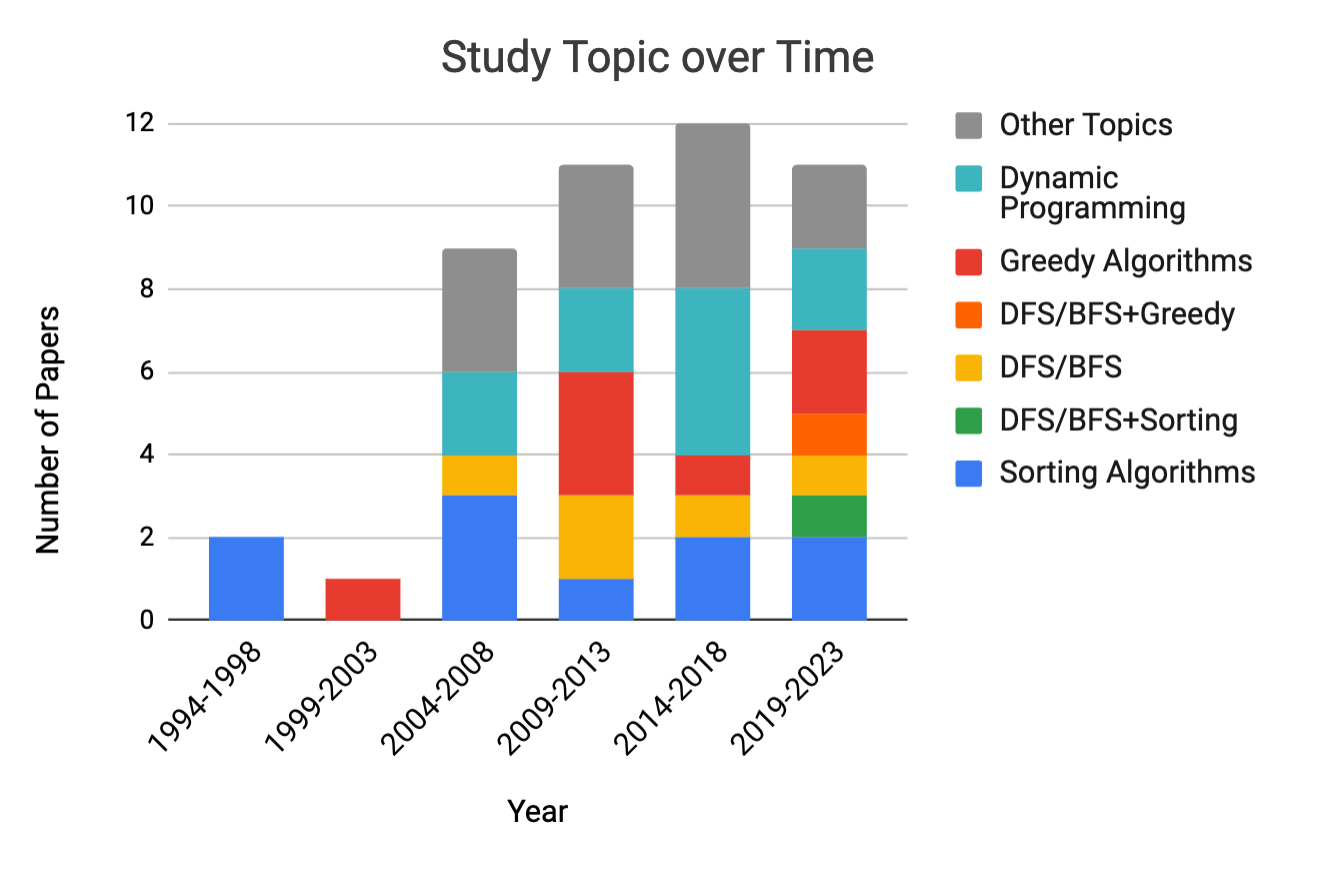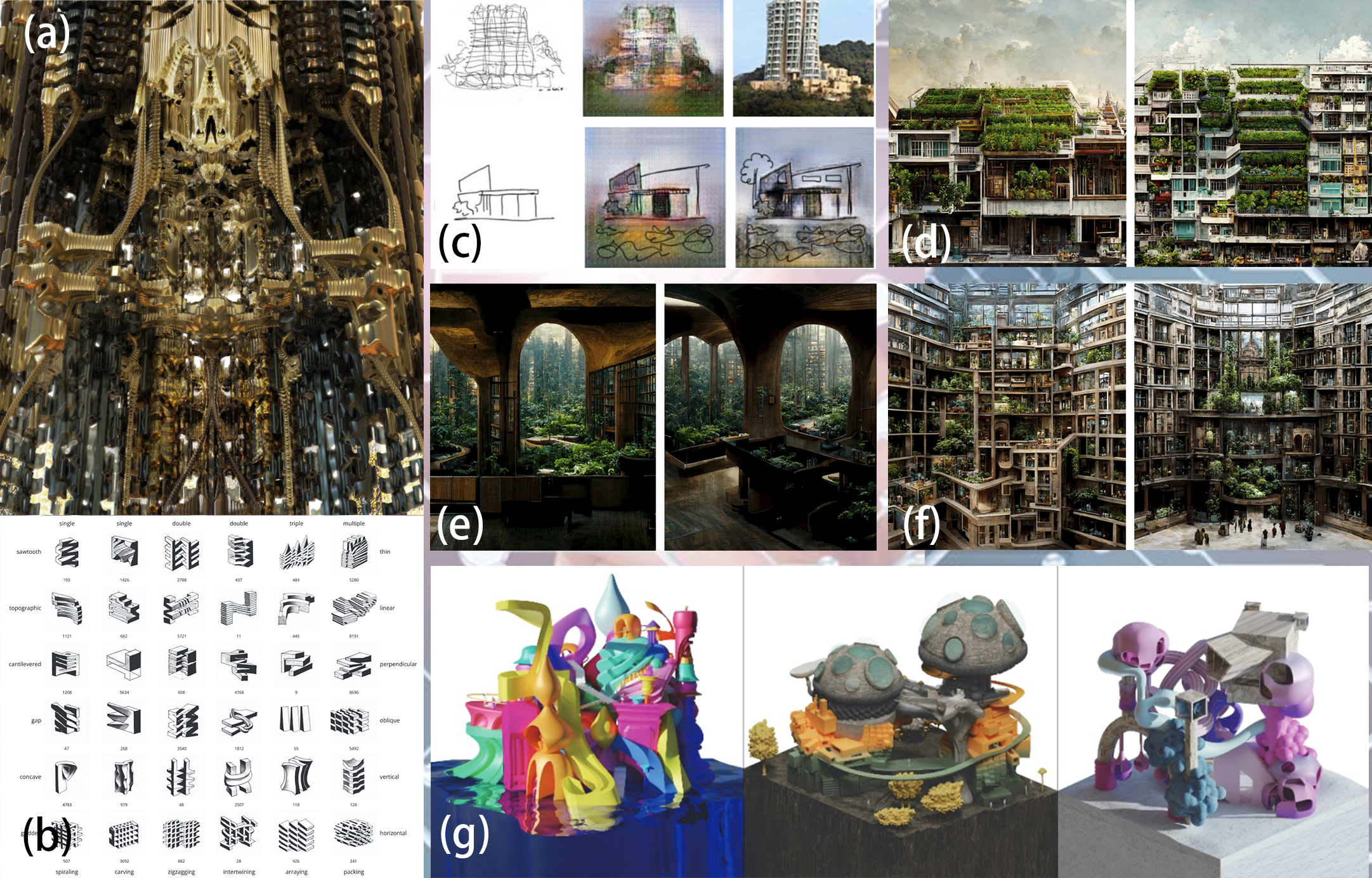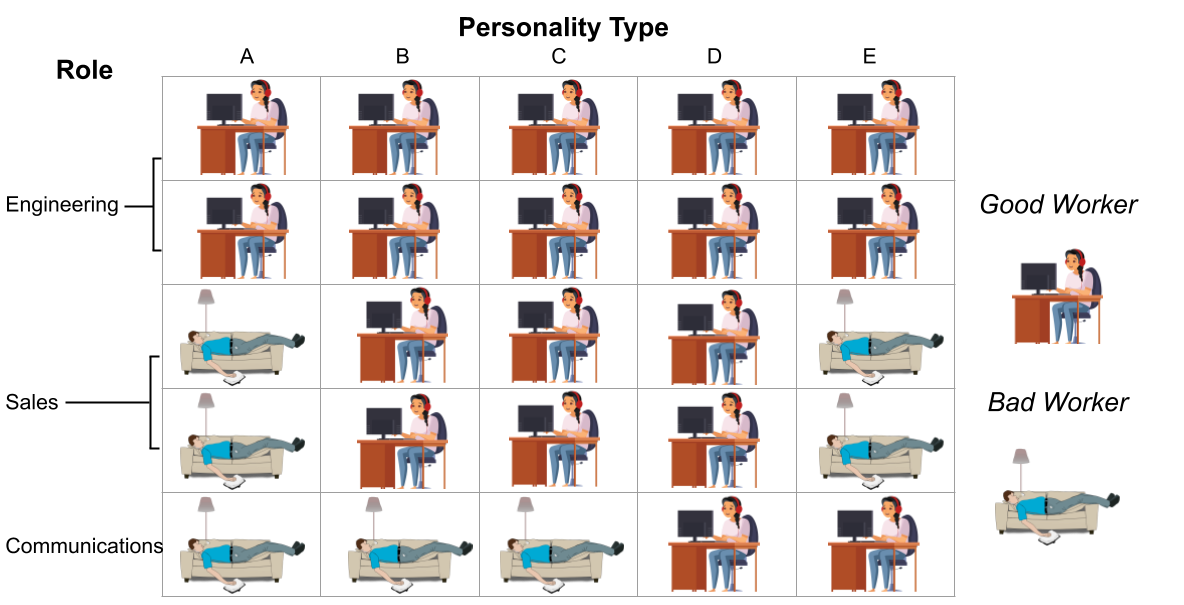Teaching Algorithm Design: A Literature Review
2405.00832

0
0

Abstract
Algorithm design is a vital skill developed in most undergraduate Computer Science (CS) programs, but few research studies focus on pedagogy related to algorithms coursework. To understand the work that has been done in the area, we present a systematic survey and literature review of CS Education studies. We search for research that is both related to algorithm design and evaluated on undergraduate-level students. Across all papers in the ACM Digital Library prior to August 2023, we only find 94 such papers. We first classify these papers by topic, evaluation metric, evaluation methods, and intervention target. Through our classification, we find a broad sparsity of papers which indicates that many open questions remain about teaching algorithm design, with each algorithm topic only being discussed in between 0 and 10 papers. We also note the need for papers using rigorous research methods, as only 38 out of 88 papers presenting quantitative data use statistical tests, and only 15 out of 45 papers presenting qualitative data use a coding scheme. Only 17 papers report controlled trials. We then synthesize the results of the existing literature to give insights into what the corpus reveals about how we should teach algorithms. Much of the literature explores implementing well-established practices, such as active learning or automated assessment, in the algorithms classroom. However, there are algorithms-specific results as well: a number of papers find that students may under-utilize certain algorithmic design techniques, and studies describe a variety of ways to select algorithms problems that increase student engagement and learning. The results we present, along with the publicly available set of papers collected, provide a detailed representation of the current corpus of CS Education work related to algorithm design and can orient further research in the area.
Get summaries of the top AI research delivered straight to your inbox:
Overview
• This paper provides a comprehensive literature review on the teaching of algorithm design, a fundamental topic in computer science education.
Plain English Explanation
The paper examines the various approaches and techniques used to teach algorithm design, which is the process of creating step-by-step instructions for solving a problem using a computer. Algorithm design is a critical skill for computer science students, as it underpins the development of software and applications.
The review covers a range of teaching methods, from traditional lectures and textbook-based instruction to more interactive and hands-on approaches. It discusses the challenges of teaching algorithm design, such as helping students develop problem-solving skills and logical thinking, and highlights innovative teaching strategies that have been proposed and evaluated.
The paper also explores the role of technology, such as visualization tools and programming environments, in enhancing the learning of algorithm design. It examines how these tools can help students better understand and apply algorithm design concepts.
Overall, the literature review provides a valuable synthesis of the current state of research on teaching algorithm design, identifying best practices and areas for further exploration. This review can inform the development of more effective algorithm design curricula and teaching methods, ultimately helping students better master this essential computer science skill.
Technical Explanation
The paper conducts a comprehensive review of the literature on teaching algorithm design, a core topic in computer science education. The authors examine a wide range of teaching approaches, including traditional lectures, textbook-based instruction, and more interactive and hands-on methods.
The review covers the key challenges in teaching algorithm design, such as helping students develop problem-solving skills, logical thinking, and the ability to translate abstract concepts into working code. It highlights various teaching strategies that have been proposed and evaluated, including the use of visualization tools, programming environments, and active learning techniques.
The paper also explores the role of technology in enhancing the learning of algorithm design. It discusses how tools like algorithm visualization software and programming environments can aid students in understanding and applying algorithm design concepts.
The authors synthesize the current state of research in this area, identifying best practices and areas for further exploration. The review provides a valuable resource for educators and researchers interested in improving the teaching and learning of algorithm design.
Critical Analysis
The literature review provides a thorough and well-structured examination of the research on teaching algorithm design. The authors have done an admirable job of synthesizing a large and diverse body of literature, highlighting the key themes, challenges, and innovative approaches in this field.
One potential limitation of the review is that it may not have captured the most recent developments in the field, as the paper does not appear to have been updated since its initial publication. Additionally, the review could have delved deeper into the empirical evidence supporting the various teaching approaches, providing a more critical assessment of their effectiveness.
The paper also does not explore the potential impact of emerging technologies, such as large language models and generative AI, on the teaching of algorithm design. As these technologies continue to evolve, they may present both opportunities and challenges for algorithm design education that warrant further investigation.
Overall, the literature review is a valuable contribution to the field, providing a comprehensive overview of the current state of research and teaching practices related to algorithm design. However, there is still room for further exploration and analysis to address the evolving needs and technologies in computer science education.
Conclusion
This literature review offers a thorough examination of the research on teaching algorithm design, a fundamental topic in computer science education. The paper covers a range of teaching approaches, from traditional lectures to more interactive and technology-enabled methods, and highlights the key challenges and innovative strategies in this field.
The review synthesizes the current state of the literature, identifying best practices and areas for further exploration. By providing a comprehensive overview of the research, the paper can inform the development of more effective algorithm design curricula and teaching techniques, ultimately helping students better master this essential computer science skill.
As the field of computer science continues to evolve, with the emergence of new technologies and teaching approaches, further research will be needed to ensure that algorithm design education remains relevant and effective. This literature review lays the groundwork for continued exploration and improvement in this important area of computer science education.
This summary was produced with help from an AI and may contain inaccuracies - check out the links to read the original source documents!
Related Papers
🐍
Towards a Systems Theory of Algorithms
Florian Dorfler, Zhiyu He, Giuseppe Belgioioso, Saverio Bolognani, John Lygeros, Michael Muehlebach

0
0
Traditionally, numerical algorithms are seen as isolated pieces of code confined to an {em in silico} existence. However, this perspective is not appropriate for many modern computational approaches in control, learning, or optimization, wherein {em in vivo} algorithms interact with their environment. Examples of such {em open algorithms} include various real-time optimization-based control strategies, reinforcement learning, decision-making architectures, online optimization, and many more. Further, even {em closed} algorithms in learning or optimization are increasingly abstracted in block diagrams with interacting dynamic modules and pipelines. In this opinion paper, we state our vision on a to-be-cultivated {em systems theory of algorithms} and argue in favor of viewing algorithms as open dynamical systems interacting with other algorithms, physical systems, humans, or databases. Remarkably, the manifold tools developed under the umbrella of systems theory are well suited for addressing a range of challenges in the algorithmic domain. We survey various instances where the principles of algorithmic systems theory are being developed and outline pertinent modeling, analysis, and design challenges.
5/1/2024
🔗
Mental health of computing professionals and students: A systematic literature review
Alicia Julia Wilson Takaoka, Kshitij Sharma

0
0
The intersections of mental health and computing education is under-examined. In this systematic literature review, we evaluate the state-of-the-art of research in mental health and well-being interventions, assessments, and concerns like anxiety and depression in computer science and computing education. The studies evaluated occurred across the computing education pipeline from introductory to PhD courses and found some commonalities contributing to high reporting of anxiety and depression in those studied. In addition, interventions that were designed to address mental health topics often revolved around self-guidance. Based on our review of the literature, we recommend increasing sample sizes and focusing on the design and development of tools and interventions specifically designed for computing professionals and students.
5/7/2024

Generative AI for Architectural Design: A Literature Review
Chengyuan Li, Tianyu Zhang, Xusheng Du, Ye Zhang, Haoran Xie

0
0
Generative Artificial Intelligence (AI) has pioneered new methodological paradigms in architectural design, significantly expanding the innovative potential and efficiency of the design process. This paper explores the extensive applications of generative AI technologies in architectural design, a trend that has benefited from the rapid development of deep generative models. This article provides a comprehensive review of the basic principles of generative AI and large-scale models and highlights the applications in the generation of 2D images, videos, and 3D models. In addition, by reviewing the latest literature from 2020, this paper scrutinizes the impact of generative AI technologies at different stages of architectural design, from generating initial architectural 3D forms to producing final architectural imagery. The marked trend of research growth indicates an increasing inclination within the architectural design community towards embracing generative AI, thereby catalyzing a shared enthusiasm for research. These research cases and methodologies have not only proven to enhance efficiency and innovation significantly but have also posed challenges to the conventional boundaries of architectural creativity. Finally, we point out new directions for design innovation and articulate fresh trajectories for applying generative AI in the architectural domain. This article provides the first comprehensive literature review about generative AI for architectural design, and we believe this work can facilitate more research work on this significant topic in architecture.
4/3/2024

Designing Algorithmic Recommendations to Achieve Human-AI Complementarity
Bryce McLaughlin, Jann Spiess

0
0
Algorithms frequently assist, rather than replace, human decision-makers. However, the design and analysis of algorithms often focus on predicting outcomes and do not explicitly model their effect on human decisions. This discrepancy between the design and role of algorithmic assistants becomes of particular concern in light of empirical evidence that suggests that algorithmic assistants again and again fail to improve human decisions. In this article, we formalize the design of recommendation algorithms that assist human decision-makers without making restrictive ex-ante assumptions about how recommendations affect decisions. We formulate an algorithmic-design problem that leverages the potential-outcomes framework from causal inference to model the effect of recommendations on a human decision-maker's binary treatment choice. Within this model, we introduce a monotonicity assumption that leads to an intuitive classification of human responses to the algorithm. Under this monotonicity assumption, we can express the human's response to algorithmic recommendations in terms of their compliance with the algorithm and the decision they would take if the algorithm sends no recommendation. We showcase the utility of our framework using an online experiment that simulates a hiring task. We argue that our approach explains the relative performance of different recommendation algorithms in the experiment, and can help design solutions that realize human-AI complementarity.
5/3/2024